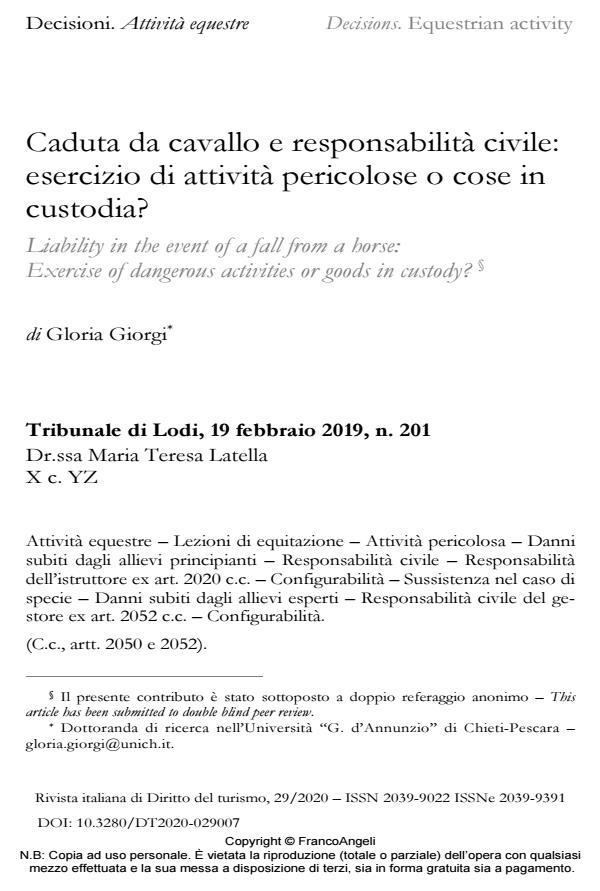Liability in the event of a fall from a horse: Exercise of dangerous activities or goods in custody?
Journal title RIVISTA ITALIANA DI DIRITTO DEL TURISMO
Author/s Gloria Giorgi
Publishing Year 2020 Issue 2020/29 Language Italian
Pages 23 P. 124-146 File size 178 KB
DOI 10.3280/DT2020-029007
DOI is like a bar code for intellectual property: to have more infomation
click here
Below, you can see the article first page
If you want to buy this article in PDF format, you can do it, following the instructions to buy download credits

FrancoAngeli is member of Publishers International Linking Association, Inc (PILA), a not-for-profit association which run the CrossRef service enabling links to and from online scholarly content.
With the ruling in comment, the Court of Lodi, intervening on the path already traced by the Cassation, established that the exercise of the professional activity consisting in the teaching of horse riding can be qualified as much as a dangerous activity, pursuant to article 2050 cc, if it is addressed to an inexperienced and young subject, how much to give rise to the different objective liability provided for by art. 2052 of the Italian Civil Code, if it is addressed to an expert and skilled rider. It follows that the release proof will vary according to the type of liability involved, to be ascertained on a case-by-case basis. Another aspect concerns the different position of the instructor with respect to that of the riding school manager. The latter will respond - as will be better highlighted - directly of the damage caused by the instructor in certain circumstances in which it is a riding school with a structured organization and with any subordinate relationships with the instructor himself. Otherwise the two subjects could, as in the case in question, remain two distinct entities in terms of responsibility, given the existence of a lease contract between them (concerning some boxes for the refreshment of the horses). The Court of Lodi, considering an in-depth investigation regarding the responsibility of trainers, instructors and equestrian centers, has concretely assessed the degree of responsibility of the responsible person, qualifying the action as a dangerous activity pursuant to art. 2050 c.c.
Gloria Giorgi, Caduta da cavallo e responsabilità civile: esercizio di attività pericolose o cose in custodia? in "RIVISTA ITALIANA DI DIRITTO DEL TURISMO" 29/2020, pp 124-146, DOI: 10.3280/DT2020-029007